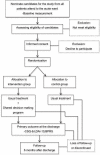Efficacy of shared decision making on treatment satisfaction for patients with first-admission schizophrenia: study protocol for a randomised controlled trial
- PMID: 24725910
- PMCID: PMC4021257
- DOI: 10.1186/1471-244X-14-111
Efficacy of shared decision making on treatment satisfaction for patients with first-admission schizophrenia: study protocol for a randomised controlled trial
Abstract
Background: Shared decision making is a promising model for patient-centred medicine, resulting in better clinical outcomes overall. In the mental health field, interventions that consider the patient-centred perspective--such as patient quality of life, involvement in the treatment, treatment satisfaction, and working alliance--have increased and better clinical outcomes discovered for patients with schizophrenia. However, few studies have examined the efficacy of shared decision making for schizophrenia treatment. The objective of this study is to evaluate the effect of a shared decision making intervention compared to treatment as usual on patient satisfaction at discharge for first-admission patients with schizophrenia.
Methods/design: This is a randomised, parallel-group, two-arm, open-label, single-centre study currently being conducted in an acute psychiatric ward of Numazu Chuo Hospital, Japan. We are recruiting patients between 16 and 65 years old who are admitted to the ward with a diagnosis of schizophrenia without prior experience of psychiatric admission. Fifty-eight participants are being randomised into a shared decision making intervention group or a treatment as usual control group in a 1:1 ratio. The intervention program was developed based on a shared decision making model and is presented as a weekly course lasting the duration of the patients' acute psychiatric ward stay. The primary outcome measure is patient satisfaction at discharge as assessed by the Client Satisfaction Questionnaire. Due to the study's nature, neither the patient nor staff can be blinded.
Discussion: This is the first randomised controlled trial to evaluate the efficacy of shared decision making for patients with early-treatment-stage schizophrenia. The intervention program in this study is innovative in that it includes both of the patient and staff who are involved in the treatment.
Trial registration: The study has been registered with ClinicalTrials.gov as NCT01869660.
Figures
References
-
- Laine C, Davidoff F. Patient-centered medicine. A professional evolution. JAMA. 1996;275:152–156. - PubMed
-
- Truog RD. Patients and doctors–evolution of a relationship. N Engl J Med. 2012;366:581–585. - PubMed
-
- Charles C, Gafni A, Whelan T. Shared decision-making in the medical encounter: what does it mean? (or it takes at least two to tango) Soc Sci Med. 1997;44:681–692. - PubMed
-
- Stacey D, Bennett CL, Barry MJ, Col NF, Eden KB, Holmes-Rovner M, Llewellyn-Thomas H, Lyddiatt A, Légaré F, Thomson R. Decision aids for people facing health treatment or screening decisions. Cochrane database Syst Rev. 2011;10:CD001431. http://www.ncbi.nlm.nih.gov/pubmed/21975733. - PubMed
-
- Lacro JP, Dunn LB, Dolder CR, Leckband SG, Jeste DV. Prevalence of and risk factors for medication nonadherence in patients with schizophrenia: a comprehensive review of recent literature. J Clin Psychiatr. 2002;63:892–909. - PubMed
Publication types
MeSH terms
Associated data
LinkOut - more resources
Full Text Sources
Other Literature Sources
Medical


